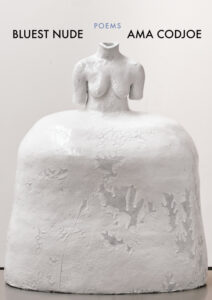Ama Codjoe is the author of Bluest Nude (Milkweed Editions, 2022) and Blood of the Air (Northwestern University Press, 2020), winner of the Drinking Gourd Chapbook Poetry Prize. Her recent poems have appeared in The Nation, The Atlantic, The Best American Poetry series, and elsewhere. Among other honors, she has received a Rona Jaffe Foundation Writer’s Award, a Creative Writing Fellowship from the National Endowment for the Arts, a NYSCA/NYFA Artist Fellowship, and a Jerome Hill Artist Fellowship. She lives in New York City.
Table of Contents:
- Of Being in Motion
- On Seeing and Being Seen
- Bluest Nude



 Dakota Crescent, Singapore
Dakota Crescent, Singapore








